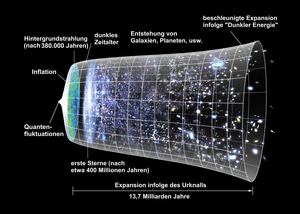
Back Pandeïsme Afrikaans ربوبية كلية Arabic Pandeizm Azerbaijani সর্বেদেবতাবাদ Bengali/Bangla Pandeisme Catalan Pandeisme Danish Pandeism English Pandeísmo Spanish Pandeism Estonian همهدادارباوری Persian

Pandeismus (von altgriechisch πᾶν pān „alles“ sowie lat. deus „Gott“) bezeichnet eine Auffassung von Gott, die den metaphysisch geprägten Pantheismus (Gott ist das Universum) und den Deismus (Gott schuf das Universum) kombiniert.[1]
Es ist der Glaube, „dass Gott das Universum geschaffen hat, jetzt eins mit ihm ist, und deshalb kein separates bewusstes Wesen.“[2] Deshalb muss er auch nicht verehrt werden, denn Gott ist gewordene Natur.
- ↑ Raphael Lataster: There was no Jesus, there is no God: A Scholarly Examination of the Scientific, Historical, and Philosophical Evidence & Arguments for Monotheism. 2013, ISBN 1492234419, S. 165: “This one god could be of the deistic or pantheistic sort. Deism might be superior in explaining why God has seemingly left us to our own devices and pantheism could be the more logical option as it fits well with the ontological argument’s ‘maximally-great entity’ and doesn’t rely on unproven concepts about ‘nothing’ (as in ‘creation out of nothing’). A mixture of the two, pandeism, could be the most likely God-concept of all.”
- ↑ Alan H. Dawe: The God Franchise: A Theory of Everything. 2011, ISBN 0473201143, S. 48.